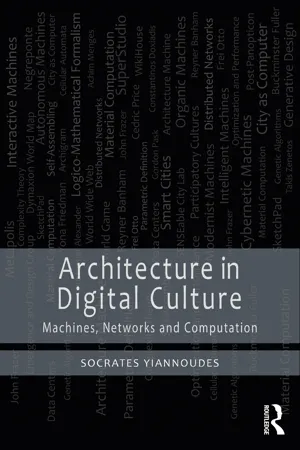
- 148 pages
- English
- ePUB (mobile friendly)
- Available on iOS & Android
About this book
This book examines the manifestations of architecture, cities, and design processes within digital culture.
Adopting a comparative and critical method, the author looks at past and present encounters of the digital with architectural discourse and practice. Along three central themes – machines, networks, and computation – the book begins by discussing transformations of the analogy between architecture and the machine since the early twentieth century, foregrounding questions about the relations between architecture, humans, machines, and the environment. It moves on to the city, to observe how big data and smart city sustainable management systems have transformed historical visions of global networked cities. Lastly, it explores computational design thinking historically and in the context of complex systems, as well as the latest technical, social, and economic developments. Exposing possible drawbacks while still focusing on what is radically innovative, this book proposes a way toward more liberating, digital, and sustainable futures for architecture.
An important read for architecture students, academics, and professionals, this book connects instances of digital architecture practice and discourse throughout the history of the digital culture paradigm and their ties with sociopolitical developments. It shares the possibility that these connecting lines may be the canvas for a novel architectural history of the recent past.
Frequently asked questions
- Essential is ideal for learners and professionals who enjoy exploring a wide range of subjects. Access the Essential Library with 800,000+ trusted titles and best-sellers across business, personal growth, and the humanities. Includes unlimited reading time and Standard Read Aloud voice.
- Complete: Perfect for advanced learners and researchers needing full, unrestricted access. Unlock 1.4M+ books across hundreds of subjects, including academic and specialized titles. The Complete Plan also includes advanced features like Premium Read Aloud and Research Assistant.
Please note we cannot support devices running on iOS 13 and Android 7 or earlier. Learn more about using the app.
Information
Table of contents
- Cover Page
- Half-Title Page
- Title Page
- Copyright Page
- Contents
- List of Figures
- Preface
- Introduction
- Machines
- Networks
- Computation
- Concluding Thoughts
- Index